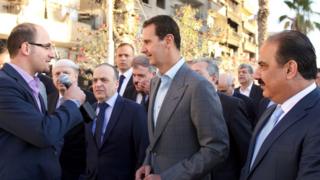World
-
Date:
-
9/12/2016
-
Time:
-
08:33:31
-
-

-
Source:
-
BBC News
-
-
-
Content:
-
A partial truce brokered by the US and Russia in Syria was due to come into effect at sunset on Monday, the beginning of the Islamic festival of Eid al-Adha.
If successful, it will see President Bashar al-Assads forces ending air strikes on territory controlled by mainstream rebels, and both sides allowing humanitarian access to besieged areas.
It will also lead to co-ordinated air strikes by the US and Russia against so-called Islamic State and the rival jihadist group Jabhat Fateh al-Sham, which was known as al-Nusra Front until it broke off formal ties with al-Qaeda in July.
The Syrian government has given its backing, but a number of rebel groups have expressed strong reservations and have yet to say whether they will abide by it.
The US and Russia back opposing sides in Syrias five-year civil war, which has left more than 250,000 people dead and displaced more than 11 million others.
After 10 months of negotiations that the US said were marred by deep "mistrust", US Secretary of State John Kerry and Russian Foreign Minister Sergei Lavrov announced on Saturday that they had reached an agreement on a "sustainable" cessation of hostilities that would facilitate negotiations on a political settlement.
The deal, which begins with a 48-hour renewable truce, involves three phases:
Behind the scenes at the Syria talks
Life and death in Syria
Why is there a war in Syria?
Mr Lavrov said the Syrian government, which Russia has supported with hundreds of air strikes over the past 11 months, was "ready to fulfil" the arrangements.
However, President Assad proclaimed his determination on Monday to "recover every area from the terrorists", a term he has used to describe all armed opponents. The armed forces would be "continuing their work, relentlessly and without hesitation", he added.
The main umbrella group representing political and armed opposition factions, the High Negotiations Committee, meanwhile said it wanted "guarantees" on the implementation of the truce deal before endorsing it.
Spokesman Salem al-Meslet said it was not clear how the US and Russia would respond to violations and how the truce would be applied in areas where fighters from both Jabhat Fateh al-Sham and mainstream rebel groups were present.
The Western-backed Free Syrian Army said rebel groups fighting under its banner would "co-operate positively" with the truce, but were concerned that it would benefit the government.
The hardline Islamist group Ahrar al-Sham condemned the agreement as an effort to drive rebel factions apart, but stopped short of explicitly rejecting it outright.
Grim prospect of 10 more years of war
Mr Kerry stressed that he and Mr Lavrov had worked very hard to ensure they were not repeating the mistakes of previous truces, which have collapsed within days or weeks with both sides accusing each other of repeated violations.
During the short-lived cessation of hostilities negotiated by Washington and Moscow in February, Syrian government forces had continued to indiscriminately bomb opposition-held areas, meaning rebel forces had felt compelled to return fire, Mr Kerry said.
The "melding together" of mainstream rebels and Jabhat Fateh al-Sham fighters on the ground had also sown confusion, he added.
This time, in theory, Russia will ensure the Syrian air force stops bombing opposition territory altogether and the US will be able to "delineate and separate" rebels and jihadists.
Mr Kerry acknowledged the sceptical reaction of Syrians on all sides on Saturday, telling reporters: "No-one is building this based on trust. It is based on a way of providing oversight and compliance through mutual interest and other things."
-
Orignial Link :
-
http://www.bbc.com/news/world-middle-east-37340468
-
crawlTime:
-
9/12/2016 2:56:01 PM
Back to List
All Comments
|
UserName
|
commentContent
|
numOfComentLikes
|
Datetime
|
|
ADD A COMMENT
